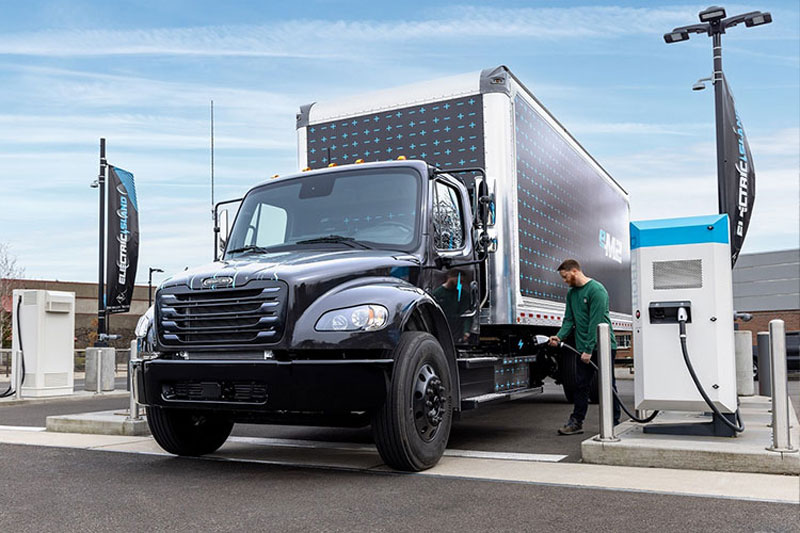Michigan, Daimler North America, DTE Working to Build Truck Stop of Future

The state of Michigan is working to develop a working prototype program known as the Mobility Charging Hub, which will help to enable companies to transition their commercial fleets to electric commercial vehicles (EVs).
Michigan will have access to $13 million in public funding to support the Mobility Charging Hub development and secure partnerships with companies seeking to test and implement solutions related to EV innovation, fleet management, and overall ease of travel. Initial project partners are Daimler Truck North America (DTNA) and DTE Energy.
The hub, to be located at an existing trucking facility in Redford near I-96, also will serve passenger vehicle charging. Charging infrastructure and slow charging times are among multiple challenges before the broad deployment of EVs is possible.
“We’re excited to partner with the state of Michigan and DTNA to put this site on a key highway corridor for commercial vehicles,” says Tony Tomczak, vice president of electric sales and marketing at DTE. “As DTE’s first venture into owning and operating EV chargers, we’re a proud leader in building publicly accessible EV charging for medium- and heavy-duty vehicles, giving our fleet customers another reason to electrify.”
To help make this possible, Michigan’s Department of Labor and Economic Opportunity, Michigan’s Office of Future Mobility and Electrification (OFME) is getting $8.5 million in federal funding support from a Rebuilding American Infrastructure with Sustainability and Equity (RAISE) grant award to establish a grant program through the Mobility Charging Hub that will help fund future activations onsite.
As EVs become more commonplace across passenger and commercial transit alike, truck stops face a fundamental point of evolution to their existing service models. This challenge, however, represents an opportunity to unlock new revenue in the trucking space, create new jobs, as well as redesign urban, suburban, and rural spaces into more sustainable community assets.
Through the new Mobility Charging Hub, Michigan seeks to develop the partnerships, integrations, and business models necessary for accelerating the transition to EVs at scale, while informing a playbook replicable across truck stop locations nationwide.
The Mobility Charging Hub will tackle solutions development through several multi-phased initiatives. In the first phase, the core infrastructure to support EV charging at the site will be established as a foundation. DTE will operate the core infrastructure of the Mobility Charging Hub — including EV charging solutions, solar canopies, and battery energy storage systems, and will look to partner with third-party operators for value-added services.
After successful demonstrated usage and commercial viability in the first phase, OFME and its partners will work to enable the Mobility Charging Hub as a platform for testing innovation, similar to sites like the Detroit Smart Parking Lab, Michigan Central, and the FLITE program at Gerald R. Ford International Airport in Grand Rapids.
DTNA’s Redford facility is equipped with the necessary power, making it an ideal location for the Mobility Charging Hub, state officials note. The location sees more than 10,000 medium and heavy-duty commercial trucks travel daily across the state, or across the state’s borders into Canada.
Furthermore, Michigan accounts for 30 percent of all truck and rail freight between the United States and Canada, making Redford an ideal first location to concentrate on for this activation. In addition, DTNA’s existing workforce training programs for EVs can be expanded in the future to provide training programs related to agnostic EV charging infrastructure with the establishment of the Mobility Charging Hub.

